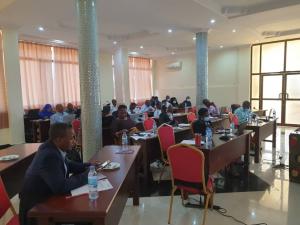Rule of law is key to curbing non communicable diseases
24-26 May 2021, Morogoro: Non-communicable diseases (NCDs) account for widespread illness and disability, and over 70 per cent of all deaths worldwide, killing 41 million people worldwide every year. Key risk factors include unhealthy diets and physical inactivity, increasing the risk of life-threatening conditions such as diabetes and heart disease to men, women, girls, and boys of all income levels. Overall, unhealthy diets pose a greater risk to morbidity and mortality than do unsafe sex, alcohol, drug, and tobacco use combined. The rule of law is a crucial part of the response to NCDs. Through regulation and fiscal reforms, countries can promote healthy diets, physical activity, and other initiatives reducing the prevalence and harms of NCDs.
The Ministry of Health in Tanzania Mainland and Zanzibar with support from WHO, the International Development Law Organization (IDLO) and the International Development Research Centre (IDRC), are currently implementing the RECAP Program (Global Regulatory & Fiscal Capacity Building Program), which aims to build national capacity for the development and implementation of regulatory and fiscal measures for diet and physical activity. The Ministry of Health considers the use of law as a powerful policy tool for the prevention and control of noncommunicable diseases (NCDs) – particularly in the introduction of appropriate legislation/regulations to support implementation of marketing restrictions and comprehensive nutrition labelling. The Country Needs Assessment Report (2019) revealed that there are no specific restrictions on marketing of foods high in salt, fats and/or sugars to children. Regulations and guidelines currently restricting marketing of some food products, may be used as an entry point for legal reform.
It is in this context that a 3-day hybrid capacity building workshop with local and international facilitators from WHO Headquarters and Regional Offices was organized for lawyers and regulators from Mainland and Zanzibar. Through presentations, plenary discussions and group works, 20 lawyers and regulators oriented on legal issues related to healthy diet and physical activity. It is envisaged that through such capacity building programmes, WHO and partners will be promoting the increasing international awareness of links between SDG 3 on healthy lives and wellbeing and other SGDs, especially SDG 16 on peace, justice, and strong institutions.




